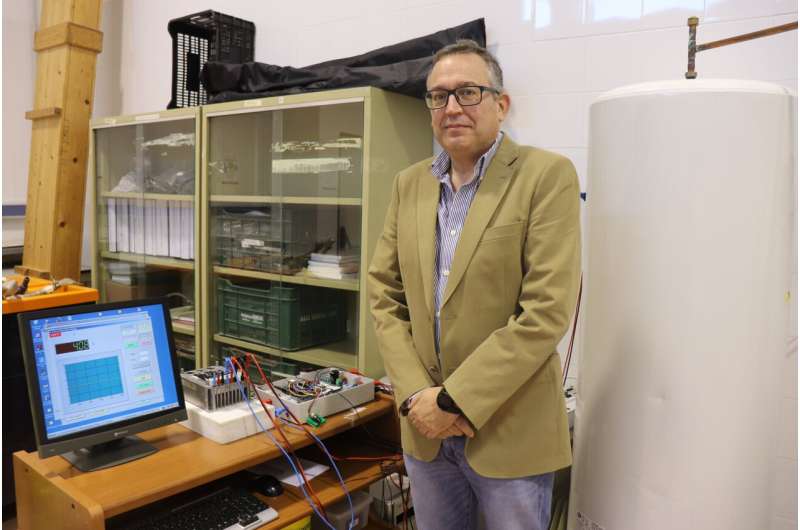#Photovoltaic solar heating system uses 95% of energy available to heat water

“#Photovoltaic solar heating system uses 95% of energy available to heat water”

A research team at the University of Córdoba has designed a sustainable photovoltaic solar device that can heat water up to 80 degrees—just like a regular electric heater
A significant percentage of buildings’ energy consumption is to produce hot water. Photovoltaic solar heating can be considered a clean and renewable energy option. Easy to install, silent, and low maintenance, it also prevents the consumption of fossil fuels normally used for this process. Now, a research group at the University of Córdoba has designed a photovoltaic solar heating device that takes advantage of 95.06% of the energy available to produce domestic hot water.
The prototype they designed manages to heat the water to 80 degrees, just like a normal electric heater would. No type of waste or polluting gas is produced during this process. Compared to solar thermal energy, which requires a hydraulic installation, this model would only use an electricbox similar to the conventional ones found at houses, to which solar panels and a conventional electric water heater are connected, with two cables. “It’s a model that is much more versatile, sustainable and economical, and only produces a 5% loss of energy”, explained Principal Investigator Luis Cámara-Díaz.
This new system focuses specifically on domestic hot water, but it could be applied to commercial and industrial use, according to Cámara-Díaz. The heating process relies on thermal electric resistors powered by photovoltaic solar energy. “Conventional hot water tanks have an electrical resistor inside, that, when connected to electricity, generates heat. We call this thermoresistance The difference with respect to our prototype is that we connect it into the photovoltaic solar panels instead of the electrical current,” he added. In this way the existing solar energy is converted into photovoltaic energy, which can be used for heating any time of the day. The water tank functions as an accumulator of all that daily energy, averting the need to install batteries.
A breakthrough made with this low-cost electronic system is that it is possible to convert the available photovoltaic energy into heat, regardless of whether existing solar radiation levels are high or low.
Moreover, its installation does not require a large number of solar panels, nor must it be connected to the electrical grid. And, it is compliant with safety measures, like any other electrical/electronic device, the researcher indicated. The device is currently in the experimental phase, with the prospect of being commercialized in the future. One of the advances that the research team is also working on is the application of Artificial Intelligence to this device, to enhance the system’s safety and monitoring.
The findings were published in Sustainability.
Distilleries need blend of green energy and storage to reach net zero
Luis Cámara-Díaz et al, A Cost-Effective and Efficient Electronic Design for Photovoltaic Systems for Solar Hot Water Production, Sustainability (2021). DOI: 10.3390/su131810270
Citation:
Photovoltaic solar heating system uses 95% of energy available to heat water (2021, November 5)
retrieved 7 November 2021
from https://techxplore.com/news/2021-11-photovoltaic-solar-energy.html
This document is subject to copyright. Apart from any fair dealing for the purpose of private study or research, no
part may be reproduced without the written permission. The content is provided for information purposes only.
If you liked the article, do not forget to share it with your friends. Follow us on Google News too, click on the star and choose us from your favorites.
For forums sites go to Forum.BuradaBiliyorum.Com
If you want to read more Like this articles, you can visit our Science category.


